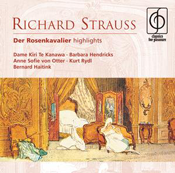
20 Jul 2008
Der Rosenkavalier highlights on Classics for Pleasure
For the opera of average length, a decent highlights disc can feature as much as half the score.
The opera world, always ravenous for talented, charismatic tenors, felt desperate hunger pains last summer, when Rolando Villazón canceled dates with an explanation that a health crisis necessitated a sabbatical from singing.
At the Rossini Festival held in Pesaro, Italy, Dynamic recorded two Rossini rarities in August 2006.
The late Guiseppe Sinopoli (1946-2001) became established as an estimable conductor of nineteenth-century music, and his legacy includes a number of fine recordings.
The best thing about this set, a Norma recorded live at the Teatro delle Muse di Ancona in late 2004, is the booklet essay by Marco Beghelli, offered in both English and Italian (no credit to any translator).
At one time, Verdi’s Aida figured as the most performed opera.
This Dynamic recording of Meyerbeer's Semiramide, an opera title more familiar with Rossini's name appended, mixes the pleasure of a modestly appealing surprise with regret at key aspects of the performance.
Among the choral music of Anton [Antonin] Dvorak, the familiar Stabat Mater, Op. 58, is known to modern audiences through various live performances and recordings.
A nostalgic charm permeates these filmed productions from the early 1970s of Lortzing's Zar und Zimmerman and Mozart's Die Zauberflöte, collaborations between the Hamburg State Opera and German TV director Joachim Hess.
The opera highlights series from Classics for Pleasure continues its recycling of the EMI catalogue with selections from two of Herbert von Karajan's recordings.
With this recording of songs by Henry & William Lawes, musical brothers who flourished in Caroline England, countertenor Robin Blaze with lutenist Elizabeth Kenny continue their exploration of early English song for Hyperion, and the results are stunning.
The title of this recording “Joy: the Laments of Gilles Binchois” introduces a seeming contradiction, one that plays on a contemporaneous description of the composer as "pére de joyeusetè"—the father of joy—in tension with an affinity for melancholy in his works.
Even though it is one of the important operas of the twentieth century, Arnold Schoenberg’s Moses und Aron is, perhaps, more esteemed than performed.
Premiered in 1926, Paul Hindemith’s opera Cardillac is a three-act work based on E. T. A. Hoffmann’s short story Das Fräulein von Scuderi.
In the 1983 production designed, staged, and directed by Jean-Pierre Ponnelle, this recording of Richard Wagner’s Tristan und Isolde is a solid and well-thought performance that has much to offer.
Recorded between 1938 and 1942, the excerpts from performances of Der Rosenkavalier, Die Frau ohne Schatten, Arabella, and Daphne at the Dresden Staatsoper are all conducted by Karl Böhm.
At the centenary of the birth of the conductor Herbert von Karajan various commemorations are occurring, an among them is the concise CD and DVD release by Deutsche Grammophon, with both discs bound into a booklet that includes a short prose tribute to the man illustrated with some well-chosen photographs from various parts of his career.
Consumers might opt for a highlights set instead of a full recording of an opera for many reasons.
Naxos's DVD division has already released the performances on this disc of Virgil Thomson's scores for The Plow that Broke the Plains and The River, as soundtracks for a re-release of the original films. That DVD (Naxos 2.110521) contained, as...
As difficult as it is to identify a single score as representative of its composer, Symphony no. 8 in C minor by Anton Bruckner is an essential work that may be regarded as the quintessence of his accomplishments in the form.
Why should anyone buy a German language broadcast of a delicious French opéra-comique?

For the opera of average length, a decent highlights disc can feature as much as half the score.
But for Strauss and Hofmannstahl's classic Der Rosenkavalier, even a very full disc, like this one from Classic for Pleasure, can only contain about a third of the music. Nonetheless, CfP has done an admirable job of selecting scenes and sections that not only contain the most beloved music, but which also give a good sense of the story's rollicking comedy and nostalgic, sentimental core. The 22 tracks take the listener right from the erotic trumpeting of the introduction through to the ecstatic climax and ironic twinkle of the last notes.
The recording comes from 1991, with Bernard Haitink leading the Dresden forces and a cast of Kiri te Kanawa as the Marschallin, Anne Sofie von Otter as Octavian, Barbara Hendricks as Sophie, and Kurt Rydl as Baron Ochs. Richard Leech, still in good voice, has the tenor cameo role of the Italian Singer. They all give fine performances, but that last tinge of charisma and sharp characterization is naggingly absent. Kanawa in particular presents a much more detailed, moving performance on the Covent Garden DVD with Solti conducting. Hendricks would seem to be ideal casting for Sophie, but somehow hers and von Otter's voices do not blend ideally. Similarly, the final trio lacks the blossoming beauty of the best renditions.
Still, there's much to be said for the professionalism of the set, and for those who doubt they would ever have much time to listen to a complete recording, this one would be a very suitable alternative. A detailed plot summary is tied to the track listing.
Chris Mullins